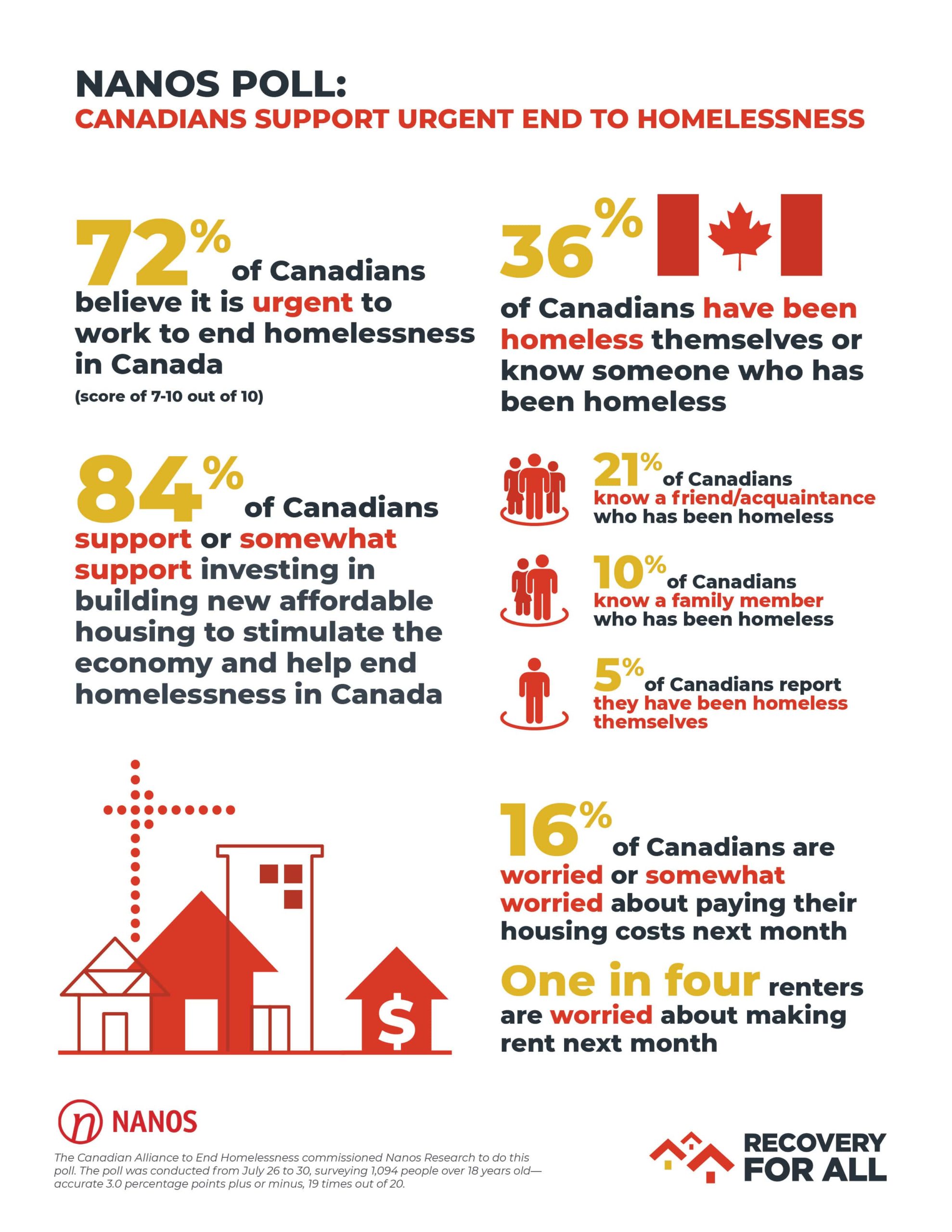In new Nanos Research poll on homelessness and housing, over 8 in 10 Canadians say they support or somewhat support investing in new affordable housing as part of pandemic recovery
 As eviction moratoriums lift across the country and pandemic recovery plans develop, many people face the risk of losing their homes and over 1 in 4 Canadian renters are worried or somewhat worried about paying their housing costs this month. At the same time, Canadians rate the urgency of ending homelessness in Canada at 7.5 out of 10— and 84% of Canadians support or somewhat support affordable housing investment as part of pandemic recovery economic stimulus, according to a new poll conducted by Nanos Research and commissioned by the Canadian Alliance to End Homelessness.
As eviction moratoriums lift across the country and pandemic recovery plans develop, many people face the risk of losing their homes and over 1 in 4 Canadian renters are worried or somewhat worried about paying their housing costs this month. At the same time, Canadians rate the urgency of ending homelessness in Canada at 7.5 out of 10— and 84% of Canadians support or somewhat support affordable housing investment as part of pandemic recovery economic stimulus, according to a new poll conducted by Nanos Research and commissioned by the Canadian Alliance to End Homelessness.
The poll, conducted over July 26 to 30, shows a strong majority of Canadians rank ending homelessness in Canada as an urgent priority, while a staggering number report having experienced homelessness themselves (5%) or knowing a family member (10%), or a friend/acquaintance (21%) who has been homeless. These results suggest as many as 1.6 million Canadians have experienced homelessness at some point in their lives. Although no exact number of how many people experience homelessness in Canada exists, it is estimated that 235,000 people in Canada experience it every year and 1.7 million households are in core housing need.
“What this poll confirms is a strong majority of Canadians—across the country and across the political spectrum—support urgent action on homelessness and investments in affordable housing as part of the pandemic recovery,” says Tim Richter, Canadian Alliance to End Homelessness President & CEO. “A key driver of this support may in fact be because so many Canadians have a personal connection to it, or through the pandemic have a new appreciation for the importance of home.”
While just under 1 in 6 Canadians are worried or somewhat worried about paying their housing costs, 1 in 4 renters are worried or somewhat worried about paying their housing costs next month.
Over 8 in 10 Canadians polled say they support (50%) or somewhat support (34%) investing in building new affordable housing as part of pandemic recovery economic stimulus —people from BC report a higher intensity of support for this (63%) compared to the Prairies (37%). People with incomes of $20,000 to $60,000, as well as renters, also report a higher intensity of support.
This is why the Recovery for All campaign’s 6-point plan to end homelessness is a relevant and effective plan—with affordable and achievable measures to do it by 2030 whilst creating 500,000 jobs, doubling new construction of affordable housing under the National Housing Strategy to 370,000 units over 10 years, and preventing homelessness for 300,000 at-risk households.
“We’ve put forward an affordable and achievable plan to end homelessness, create over 500,000 jobs and save over $18 billion,” says Richter. “We can’t go back to normal. Normal means leaving 1.6 million Canadians to experience homelessness at some point in their life.”
For more information about the poll visit, www.recoveryforall.ca/poll. Register for today’s webinar at 1 p.m. EST to hear Tim Richter and Nik Nanos discuss the poll’s findings in greater detail, click here.
Key Facts:
- 1 in 20 Canadians say they have experienced homelessness at one point in their life.
- 36% of Canadians have been homeless themselves or know someone who has been homeless.
- Just over 1 in 5 Canadians report having a friend or acquaintance that has been homeless.
- Canadians rate the urgency of ending homelessness a 7.5 out of 10. About 72% of Canadians say it is urgent (7 to 10 out of 10).
- More than 4 in 5 Canadians would support or somewhat support investing in building new affordable housing.
- Over 8 in 10 Canadians say they support or somewhat support investing in building new affordable housing.
- The poll was conducted from July 26 to 30, surveying 1,094 people over 18 years old—accurate 3.0 percentage points plus or minus, 19 times out of 20.
- About 9% of tenants in Ontario couldn’t make rent in April and May, according to a CIBC estimate. Federation of Rental-Housing Providers of Ontario data shows that 7% of renters paid part rent or none at all during the pandemic. The Toronto Foundation found that if 1 in 20 people end up homeless, that would equate to 6,500 to 13,000 more people without a home.
- Read the report, Recovery for All: Proposals to Strengthen the National Housing Strategy and End Homelessness that explains the call for housing and how Canada can save $18 billion if it works to end homelessness. It was prepared by Steve Pomeroy, Senior Research Fellow with Carleton University Centre for Urban Research and Education.
